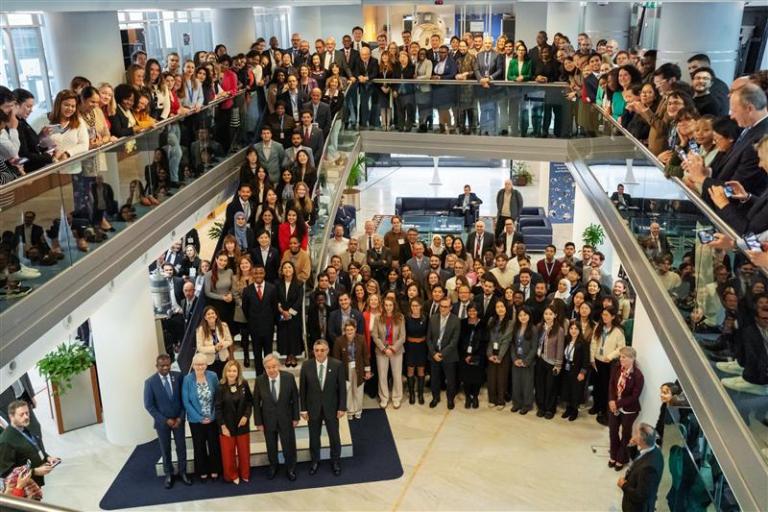Strengthen early warnings and climate action, UN Secretary-General tells WMO Congress
No country is safe from the devastating impacts of extreme weather, United Nations Secretary-General António Guterres told the World Meteorological Organization (WMO) today, calling for a rapid expansion of early warning systems to protect lives and economies.
- Antonio Guterres urges acceleration of Early Warnings for All
- WMO is barometer of truth, Mr Guterres tells 75th anniversary event
- Forecasts and warnings save millions of lives and billions of dollars
- More extreme weather reverses development gains

Mr Guterres made his first ever address to WMO to celebrate its 75th anniversary as a UN specialized agency, praising it as “a barometer of truth … a credible and clear-eyed source of data and information about the planet we share … and a shining example of science supporting humanity.”
“Without your rigorous modelling and forecasting, we would not know what lies ahead — or how to prepare for it,” the UN Secretary-General told the interactive dialogue in a a packed WMO conference chamber.
“Without your long-term monitoring, we wouldn’t benefit from the warnings and guidance that protect communities and save millions of lives and billions of dollars each year,” he said.
Early Warnings For All
The Extraordinary Congress of the 193-Member WMO marks both the organization’s 75th anniversary and the half-way point of the Early Warnings for All Initiative launched by Mr Guterres in 2022 to ensure that everyone on the planet is covered by life-saving early warnings by the end of 2027.
WMO Secretary-General Celeste Saulo issued an urgent Call to Action at a high-level event at Congress to accelerate progress to achieve the target.
“We gather at a time when our mission has never been more urgent. Yet, this is not only a moment of challenge — it is also a moment of profound opportunity to harness climate intelligence and technological advances to build a more resilient future for all,” she said.
“I would like to emphasize once again the imperative to scale up multi-hazard early warnings and impact-based forecasting; to empower National Meteorological and Hydrological Services; to expand observing networks and data exchange; and broaden the tent – for both partners and beneficiaries. We must leave nobody behind,” she said.
Every dollar invested can yield up to fifteen dollars saved in reduced disaster impacts, according to the Call to Action. It says the foundations are clear: free and open data exchange, sustainable financing, adherence to international standards, and coordinated scientific cooperation.
The need is paramount. In the last 50 years, weather, water, and climate-related hazards have claimed over 2 million lives, with 90% of those deaths occurring in developing countries. Economic costs and impacts are spiralling as weather becomes more extreme.
The Early Warnings for All initiative was launched by UN Secretary-General António Guterres in 2022. It is spearheaded by WMO, the UN Office for Disaster Risk Reduction (UNDRR), the International Telecommunications Union (ITU) and International Federation of Red Cross and Red Crescent Societies (IFRC).
Progress and Priorities
Huge progress has been made.
As of 2024, 108 countries report having some capacity for multi-hazard early warning systems, more than double the 52 countries in 2015, and this has increased further in 2025.
But big gaps remain. Disaster mortality is six times higher and the number of people affected is four times higher in countries with limited multi-hazard early warning systems.
Mr Guterres set out three urgent areas of action to achieve Early Warnings For All:
- Governments must embed early-warning systems across their policies, institutions and budgets through better coordination and alignment.
- Financing. There must be a surge in financing and easing of debt burdens for developing countries, reform of global financial institutions and strengthening of multilateral development banks.
- Climate Action. Countries must deliver bold new national climate action plans that align with limiting global temperature rise to 1.5 degrees Celsius. This includes through embracing the potential of renewable energy.
It is the first time that Mr Guterres has addressed the World Meteorological Organization. He was welcomed by WMO President Abdulla al Mandous.
“Your leadership has helped embed early warning systems into the very fabric of international agreements. Thanks to your unwavering advocacy, early warnings are now recognized at the highest levels as cost-effective, life-saving, and cross-cutting solutions that reduce climate risk and advance sustainable development,” said Mr Al Mandous.
Presidents of WMO’s Regional Associations for Africa, Asia, Europe, North, Central America and the Caribbean, Latin America took the floor in the interactive dialogue, as did top representatives of the Early Warnings for All partners: UNDRR, ITU and IFRC.
Notes to Editors
The World Meteorological Organization is the United Nations System’s authoritative voice on Weather, Climate and Water.
For further information, please contact:
- Clare Nullis WMO media officer cnullis@wmo.int +41 79 709 13 97
- Global Communication and Engagement Media Contact media@wmo.int

